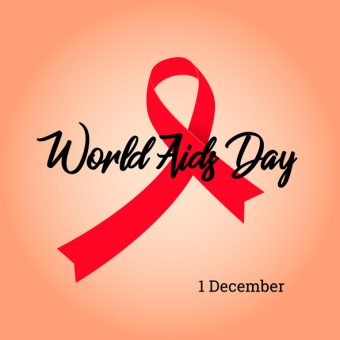 Globally, there are an estimated 36.7 million people who have the virus. Despite the virus only being identified in 1984, more than 35 million people have died of HIV or AIDS, making it one of the most destructive pandemics in history. December 1st is known as World AIDS Day and is celebrated throughout the world in order to raise awareness and show solidarity with the millions of individuals who are living with HIV worldwide. Founded in 1988, World AIDS Day was the first global health day. It’s an opportunity for people worldwide to unite in the fight against HIV, to show support for people living with HIV, and to commemorate those who have died from an AIDS-related illness. The 2017 theme is “Increasing Impact through Transparency, Accountability, and Partnerships”
Globally, there are an estimated 36.7 million people who have the virus. Despite the virus only being identified in 1984, more than 35 million people have died of HIV or AIDS, making it one of the most destructive pandemics in history. December 1st is known as World AIDS Day and is celebrated throughout the world in order to raise awareness and show solidarity with the millions of individuals who are living with HIV worldwide. Founded in 1988, World AIDS Day was the first global health day. It’s an opportunity for people worldwide to unite in the fight against HIV, to show support for people living with HIV, and to commemorate those who have died from an AIDS-related illness. The 2017 theme is “Increasing Impact through Transparency, Accountability, and Partnerships”
HIV/AIDS and Mental Illness
Human Immunodeficiency virus (HIV) is a blood-borne virus transmitted through sexual intercourse, breast-feeding and intravenous drug use that results in severe flue-like symptoms until the immune system is almost completely destroyed further resulting in a related condition known as acquired immune deficiency syndrome (AIDS). Once AIDS is diagnosed in an individual, AIDS defining infectious diseases such as Kaposi’s sarcoma, toxoplasmosis of the brain, mycobacterium, esophageal candidiasis, extra pulmonary Cryptococcus, HIV-related encephalopathy and many others are the mainstay reasons for mortality in patients diagnosed with AIDS. This deadly virus not only wreaks havoc on the physical body but also can lead to many mental health disorders. According to the National Institutes of Health, people with HIV have an increased risk for developing mood, anxiety, and cognitive disorders and are twice as likely to live with depression as those who do not have HIV. It is important to always recognize how this disorder can truly affect the mentality of an individual.
Depression and HIV
Depression is the leading cause of disability in the United States for individuals 15-44 years of age. Lost wages, medications, psychotherapy treatment, suicide treatment, co-occurring mental health disorders and associated medical diseases all contribute to this disability cost. Major depressive disorder is characterized by a sad mood, inability to concentrate, loss of interest and other symptoms that affect how an individual thinks and feels. This disorder can result in stress at home, poor workplace performance, and turmoil in relationships. Women are more likely to be affected by depression than men but this mood disorder can affect any gender, age, ethnicity or socioeconomic class; wreaking havoc in anyone’s life. Living with untreated depression can be unbearable and lead to substance abuse, medical disorders and even suicide.
Anxiety and HIV
Anxiety can be defined as a state of intense apprehension or fear resulting from a threatening event. This state of worry can be a normal part of an individual’s life on an occasional basis. When life stressors occur such as a change in job, family stress, preparing for a big exam or planning a major event, one may feel overwhelmed and anxious and eventually these anxious feelings will dissipate when the event ends or the life stressor is resolved. In individuals with anxiety disorders, these anxious feelings never go away and will often become worse over time. Approximately 18% or 40 million adults are affected by an anxiety disorder each year in the United States and these disorders affect one in eight children in the U.S. Anxiety disorders are considered the most common type of psychiatric disorders in the general population. The most commonly recognized anxiety disorders according to the Diagnostic and Statistical Manual of Mental Disorders, Fifth Edition (DSM V), range from generalized anxiety (GAD), posttraumatic stress disorder, obsessive-compulsive disorder, social anxiety disorder (SAD), and specific phobias to panic disorder and agoraphobia.
Treating mental health disorders and HIV/AIDS
HIV/AIDS can be such a devastating disorder that most often, health professionals overlook the mental health effects this disorder can have on an individual. Prescribing medications, monitoring blood counts and enrolling in new treatment studies may be the only avenues a physician will offer to an individual with a new diagnosis of HIV/AIDS. However, it is important to understand the bigger picture and treat the individual from an emotional and mental health standpoint as well. Screening for signs and symptoms of depression and anxiety should be performed on a regular basis and offering support groups that aid in mental and emotional health can also help alleviate some of the stress associated with this disorder. HIV/AIDS and any other chronic medical condition can often lead to severe mental health disorders and therefore treating these disorders as if they were co-occurring disorders may benefit the individual in the long haul.
